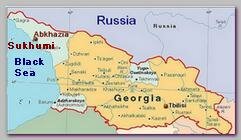– ABKHAZIA CONFLICT
–
 * ABKHAZIA – the dissident district of Georgia stretches on 8,500 square kilometer and has a population of about 230,000. ABKHAZIA is located on the Black Sea in Western Georgia and was not included in the borders of the Russian Federation after the Soviet Union disintegrated in 1989.
* ABKHAZIA – the dissident district of Georgia stretches on 8,500 square kilometer and has a population of about 230,000. ABKHAZIA is located on the Black Sea in Western Georgia and was not included in the borders of the Russian Federation after the Soviet Union disintegrated in 1989.
Like in many regions in the Caucasus, a separatist Islamic movement emerged in ABKHAZIA, similar to Islamic separatist groups in Chechnya, Dagestan, Ingushetia and elsewhere in the Caucasus that opposed the Christian Georgian rule over ABKHAZIA. In 1992 the Parliament of the Autonomous Republic of ABKHAZIA in Sukhumi declared independence from Georgia. Thousands of Muslim volunteers from the Caucasus and from all the Muslim world streamed to ABKHAZIA to conduct a guerilla war against the Georgians.
The general weakness of Georgia, which was caught in an internal turmoil and civil war, under the pro Russian Presidency of Georgia Eduard Shevardnadze, the former foreign minister of the Soviet Union, a cease fire accord was signed in 1994 which granted a degree of autonomy to ABKHAZIA within the sovereignty of Georgia. An UN-monitored and Russian-dominated peace keeping force was sent to ABKHAZIA to calm and monitor the situation.
Initially the Russian were concerned about the implications of the war in Chechnya on the Islamic militancy in ABKHAZIA and the general attitude of the Russian was supportive of Georgia.
In 2003 a dramatic change occurred in Georgia when the pro-western Mikheil Saakashvili, who grew up in USA, assumed power from Eduard Shevardnadze, on 01/24/2004 after the bloodless Rose Revolution of 11/2003 and the following quick elections in Georgia.
Mikheil Saakashvili opened Georgia to Western Democracies, enabled the paving of a large oil pipe line from the rich oil fields of Baku, in Azerbaijan on the Caspian Sea, through Georgia, to Turkey and the Black Sea and lessened the European dependency on Russian energy. Mikheil Saakashvili also tried to join NATO and called USA to build bases in Georgia, on the backdoor of Russia, in the extremely strategic and fragile Caucasus.
Since the Russians already began to gain the upper hand in the second war in Chechnya and to contain the Islamic threat in the Caucasus, the attitude of the Russian peacekeeping force in ABKHAZIA changed to be an allied supportive force for the ABKHAZIAns against the pro Western Georgia. The Russian army used the opportunity of the Georgia’s war in South Ossetia on 08/07/2008 to drive out, with the help of the local ABKHAZIAn militia, all the Georgian army and all symbols of Georgian sovereignty and declared its recognition, under Russian bayonets, of the independency of ABKHAZIA (see – Georgia Crisis ).
It is one of several examples that Muslim militants, who opposed, historically, the Russians, joined hands with the Russians to promote common interests. ABKHAZIA is also a good example that peacekeeping forces, whether it is NATO in the Balkans or Russians in the Caucasus, are there not to promote peace but to take care of their own interests.
*********** ***********